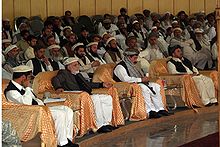
18 Mar UsetheForce:Pashtunwali
all is fair in love and war….
as shown in the movie Lone Survivor
Blindly, LONG LIVE THE FORCE..
Pashtunwali
 |
| Part of a series on |
| Pashtuns |
|---|
| Kingdoms |
| Religion |
Pashtunwali (Pashto: ??????????) or Pakhtunwali is a non-written ethical code and traditional lifestyle which the indigenous Pashtun people follow.[1][2] It could be said that it is simply a system of law and governance from the prehistoric times when humanity was completely illiterate or unable to use written instruments such as books, and is preserved and used up until modern times but mostly in the rural tribal areas. Some in the Indian subcontinent refer to it as “Pathanwali“.[3] Its meaning may also be interpreted as “the way of the Pashtuns” or “the code of life”.[4] Pashtunwali dates back to ancient pre-Islamic times and is widely practiced among Pashtuns,[5] especially among the non-urbanized Pashtuns in the countryside. In addition to being practiced by members of the Pashtun diaspora, it has been adopted by some non-Pashtun Afghans and Pakistanis that live in the Pashtun regions or close to the Pashtuns, who have gradually become Pashtunized over time.[4]
Overview
The native Pashtun tribes, often described as fiercely independent people,[6] have inhabited the Pashtunistan region (Afghanistan) since at least the 1st millennium BC.[7][8][9] During that period, much of their mountainous territory has remained outside government rule or control. This is perhaps the main reason why indigenous Pashtuns still follow Pashtunwali, which is a basic common law of the land or “code of life”.
Pashtunwali rules are accepted in Afghanistan and Pakistan (mainly in and around the Pashtunistan region), and also in some Pashtun communities around the world. Some non-Pashtun Afghans and others have also adopted its ideology or practices for their own benefit. Conversely, many urbanized Pashtuns tend to ignore the rules of Pashtunwali. Passed on from generation to generation, Pashtunwali guides both individual and communal conduct. It is practiced by the majority of Pashtuns and helps to promote Pashtunization.[4]
Ideal Pukhtun behaviour approximates the features Pukhtunwali, the code of the Pukhtuns, which includes the following traditional features: courage (tora), revenge (badal), hospitality (melmestia), generosity to a defeated…[10]
—Maliha Zulfacar, 1999
Pashtuns embrace an ancient traditional, spiritual, and communal identity tied to a set of moral codes and rules of behaviour, as well as to a record of history spanning some seventeen hundred years.[11]
Pashtunwali promotes self-respect, independence, justice, hospitality, love, forgiveness, revenge and tolerance toward all (especially to strangers or guests).[12] It is considered to be the personal responsibility of every Pashtun to discover and rediscover Pashtunwali’s essence and meaning.
It is the way of the Pathans. We have melmestia, being a good host, nanawatai, giving asylum, and badal, vengeance. Pashtuns live by these things.[13]
—Abdur, A character in Morgen’s War
-
- The Pathan tribes are always engaged in private or public war. Every man is a warrior, a politician and a theologian. Every large house is a real feudal fortress….Every family cultivates its vendetta; every clan, its feud…. Nothing is ever forgotten and very few debts are left unpaid.
- Winston Churchill (My Early Life – Chapter 11: The Mahmund Valley)
- The Pathan tribes are always engaged in private or public war. Every man is a warrior, a politician and a theologian. Every large house is a real feudal fortress….Every family cultivates its vendetta; every clan, its feud…. Nothing is ever forgotten and very few debts are left unpaid.
Main principles

From left to right: Jamaluddin Badar, Nuristan governor, Fazlullah Wahidi, Kunar governor, Gul Agha Sherzai, Nangarhar governor, and Lutfullah Mashal, Langhman governor, listen to speakers during the first regional Jirga to talk about peace, prosperity and the rehabilitation of Afghanistan.

Hamid Karzai appointed as President of the Afghan Transitional Administration at the July 2002 Loya Jirga in Kabul, Afghanistan.
Although not exclusive, the following ten principles form the major components of Pashtunwali. They are headed with the words of the Pashto language that signify individual or collective Pashtun tribal functions.
- Melmastia (hospitality) – Showing hospitality and profound respect to all visitors, regardless of race, religion, national affiliation or economic status and doing so without any hope of remuneration or favour. Pashtuns will go to great lengths to show their hospitality.[4][14][15]
- Nanawatai (asylum) – Derived from the verb meaning to go in, this refers to the protection given to a person against his or her enemies. People are protected at all costs; even those running from the law must be given refuge until the situation can be clarified.[4] Nanawatai can also be used when the vanquished party in a dispute is prepared to go in to the house of the victors and ask for their forgiveness. (It is a peculiar form of “chivalrous” surrender, in which an enemy seeks “sanctuary” at his enemy’s house). A notable example is that of Navy Petty Officer First Class Marcus Luttrell, the sole survivor of a US Navy SEAL team ambushed by Taliban fighters. Wounded, he evaded the enemy and was aided by members of the Sabray tribe who took him to their village. The tribal chief protected him, fending off attacking tribes until word was sent to nearby US forces.
- Badal (justice) – To seek justice or take revenge against the wrongdoer. There is considered to be no time limit to the period in which revenge can be taken. Justice in Pashtun lore needs elaborating: even a mere taunt (or “Paighor”) is regarded as an insult which usually can only be redressed by shedding the taunter’s blood. If he is out of reach, his closest male relation must suffer the penalty instead. Badal may lead to a blood feud that can last generations and involve whole tribes with the loss of hundreds of lives. Normally blood feuds in this male-dominated society are settled in a number of ways.[4]
- Turah (bravery) – A Pashtun must defend his land, property, family and women from incursions. He should always stand bravely against tyranny and be able to defend the honour of his name. Death can follow if anyone offends this principle.[4]
- Sabat (loyalty) – Loyalty must be paid to one’s family, friends and tribe members. Pashtuns can never become disloyal as this would be a matter of shame for their families and themselves.
- Imandari (righteousness) – A Pashtun must always strive for good in thought, word and deed. Pashtuns must behave respectfully to people, animals and the environment around them. Pollution of the environment or its destruction is against the Pashtunwali.[4]
- Isteqamat – Trust in God (known as “Allah” in Arabic and “Khudai” in Pashto).[4] The notion of trusting in the one Creator generally comports to Islamic idea of belief in only one God (tawheed).
- Ghayrat (respect, honour and courage) – Pashtuns must demonstrate courage. Their honour, or pride, has great importance in Pashtun society and must be preserved. They must respect themselves and others in order to be able to do so, especially those they do not know. Respect begins at home, among family members and relatives. If one does not have “Ghayrat” they are not classed as a Pashtun.[4]
- Naamus (protection of women) – A Pashtun must defend the honour of women at all costs and must protect them from vocal and physical harm.[4]
- Nang (Honour) – a Pashtun must defend the weak around him.

